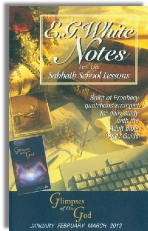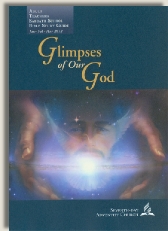|
||||||||||||||
Commentary on "The God of Grace and Judgment"
Day 5: Wednesday, January 25, 2012 - Condemnation and Grace
Overview
If yesterday was the day that this week's lesson ran off the tracks, then today is the day it plunged into the river gorge. By playing word games with "judge" and "condemn" the lesson distracts readers from the deep truth of this passage.
Observations
The lesson points out the word in verse 17 is translated as either condemn or judge depending on the translation. It then goes on to declare:
"Clearly, though, the context is that of condemnation, because God has made it clear in numerous other places that the world will be judged."
But there is no need to draw such distinctions. If the verdict has already been reached that each believer will not face condemnation, then in reality there is no judgment that they are awaiting in the future. The judgment has already been made. They will be declared righteous and will not be condemned. So their judgment day has already passed. When they believed in Jesus, God's judgment of them was already concluded.
There is no verse that more directly undermines the whole concept of believers undergoing an "investigative judgment" than this one. If it has already been determined that we will not be condemned (as this verse plainly and directly states), then what possible reason would there be for an investigation?
In Day Two, the author had pointed to Rev 20:12 as proof of the judgment. But let's examine who is judged in Rev 20:12. In Rev 20:4 the righteous are raised to reign with Christ for 1,000 years but the wicked, in verse 5, are said to remain in their graves until the 1,000 years are ended. At the end of the 1,000 years these dead come before the judgment seat of God (in verses 11 and 12). This could not be the judgment of the righteous, as they have already been raised and with Christ for 1,000 years according the SDA understanding of the Millennium.
This, along with other passages, it what have led many Christians to conclude that there are two different judgments both in timing and type. Believers aren't judged regarding salvation versus condemnation, instead they are judged regarding different eternal rewards. Unbelievers are judged based on their deeds, which are going to fail to meet the standards of God's Holiness. They are punished in accordance with their deeds-particularly the deed of rejecting Christ and thereby trampling the blood of His sacrifice which deserves a worse punishment than any breaking of the Law (Heb 10:28-29). There are some who believe that a God of Love would not punish people for not choosing Him. The standard reasoning is that because a choice based on a threat cannot produce genuine love, God could not threaten us with punishment for not choosing Him if He wants real love and service. That sounds nice and logical, but it plainly contradicts Scripture. And it returns us to the question I posed on Day 1, "what are you saved from?"
Copyright 2012 BibleStudiesForAdventists.com. All rights reserved. Revised January 17, 2012. This website is published by Life Assurance Ministries, Glendale, Arizona, USA, the publisher of Proclamation! Magazine. Contact email: BibleStudiesForAdventists@gmail.com.
The Sabbath School Bible Study Guide and the corresponding E.G. White Notes are published by Pacific Press Publishing Association, which is owned and operated by the Seventh-day Adventist church. The current quarter's editions are pictured above.
Official Adventist Resources
Standard Edition Study Guide Week 4
Teacher's Edition Study Guide Week 4
Easy Reading Edition Study Guide Wk 4
Search the Complete Published Ellen G. White Writings
Please Support This Project


